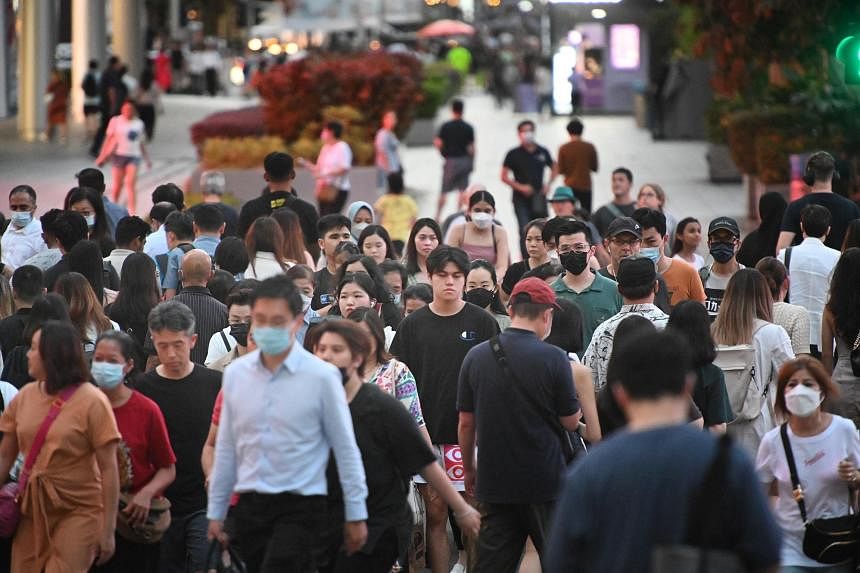SINGAPORE – The nation’s ambitious quest to map the DNA of 100,000 people has reached the halfway mark in just over a year, with about 50,000 people’s genomes – or complete set of genes – sequenced so far.
This is a significant step towards the larger goal of mapping the genes of up to one million people by 2027.
As at mid-December 2023, about 80,000 Singapore residents between the ages of 21 and 84 had stepped forward to have a comprehensive health check done and their biological samples – including blood, urine and saliva – collected to help the country build a large population health database.
The participants’ blood samples are anonymised, packed in dry ice and sent for DNA extraction before DNA sequencing is done.
The genomic data is analysed and encrypted before it is deposited into a secure database developed by genomics technology firm Illumina.
Once all 100,000 participants’ genes have been mapped, the database is set to be one of Asia’s leading reference genome databases, as Singapore’s ethnic diversity captures more than 80 per cent of Asia’s diversity.
The collection of 100,000 genome sequences will comprise 20 petabytes, or 20 million GB, of data – equivalent to about 200,000 high-definition movies.
The project, Precise-SG100K, which started in late 2022, is coordinated by the Lee Kong Chian School of Medicine.
Precise stands for Precision Health Research, Singapore, which is an entity set up to coordinate the second phase of the 10-year National Precision Medicine programme. SG100K, a comprehensive population health study of 100,000 Singaporeans, is a key partner of the programme.
Precision medicine is a targeted approach to disease treatment and prevention that takes into account individual differences in genes, environments and lifestyles. Threads of genetic material can unravel clues about a person’s risk of cancer or chronic disease, for example.
Patients who happen to carry genetic variants or “faulty genes” could have bad reactions to medications intended to treat their health problems.
One goal of the 10-year precision health programme, which ends in 2027, is to map the genes of around one million people. The programme is currently in its second phase, and the SG100K project is a key component of it.
In a website post dated Dec 11, 2023, Precise marked the milestone of completing 50,000 genome sequences by recognising its partners from the healthcare sector, academia and industry.
Among them were Illumina, which also provided the sequencing technology and equipment, and local biotech firm NovogeneAIT, which carries out the whole genome sequencing, churning out more than 760 whole genomes every week.
The 80,000 participants to date were recruited from four cohort studies, including Health for Life in Singapore (Helios), led by the Lee Kong Chian School of Medicine. Helios participants have to undergo a five-hour check-up that includes undergoing a cognitive test, having their biological samples obtained, their body composition measured, and other things. Identifiers, like their NRIC, will be removed.
The other studies are from the National University of Singapore Saw Swee Hock School of Public Health, the Singapore Eye Research Institute and the National Heart Centre Singapore.
Asians, especially South-east Asians, are known to be under-represented in genomic programmes, making up only about 3 per cent of existing population health studies globally.
Under the 10-year precision medicine programme, a local database containing 10,000 genome sequences was completed a few years ago as part of a pilot.
From that cohort, scientists learnt that nearly every individual carries at least one genetic variant that can interact poorly with a drug. This finding was in a 2022 research paper published in the Nature Communications scientific journal.
A predominant drug at play is the blood thinner warfarin, which Asians are known to be sensitive to and need lower dosages for.
From the 10,000 sequences, millions of genetic variants – previously undetected in Western studies – were revealed.
Precise is now calling for researchers to submit proposals that will unearth more health and precision medicine insights from the 50,000 completed sequences.
According to Precise’s website, applications end on Jan 31.
A strong precision medicine landscape needs genetics professionals, infrastructure and genetics literacy in both people and doctors. These are still being developed in Singapore.
Illumina’s head of Singapore, Mr Simon Giuliano, noted that genomics is a new science, and, like other countries in the Asia-Pacific, there is still a shortage of genetics-trained workers in Singapore, from counsellors to bioinformaticians.
“Patient awareness and understanding, accessibility and cost are common barriers cited across the world for the low uptake of genetic and cascade testing worldwide, especially in oncology,” he said.
Cascade testing refers to screening relatives who may be at risk of genetic conditions, after someone in the family has been diagnosed with a hereditary disease.
“Since genomics is a relatively new field of medicine, often regulatory frameworks governing how it is deployed in clinical practice are still evolving too.
“The good news is that education and training are starting to accelerate, and capability in Singapore is advancing,” added Mr Giuliano.


